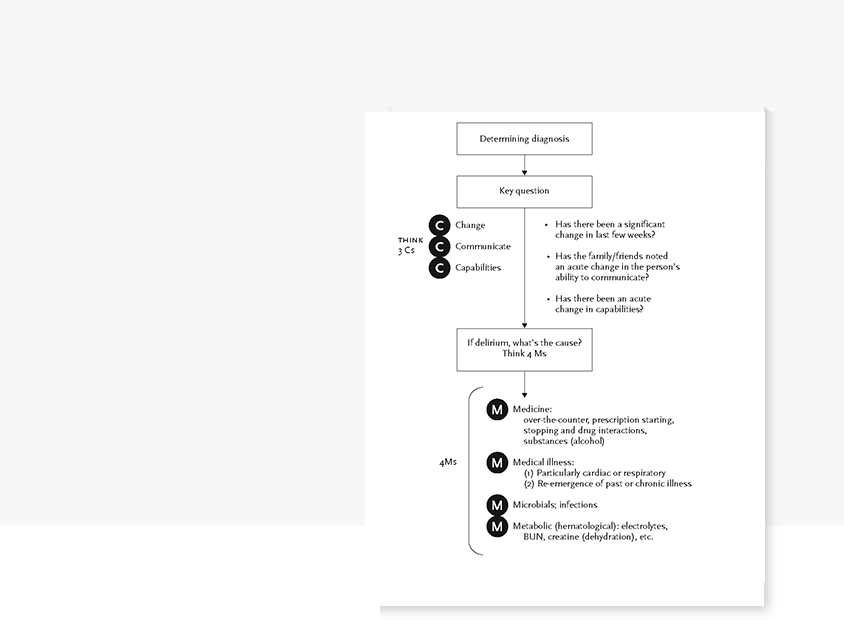XXXXXText adapted from "The patient with dementia" in Psychiatry in primary care by Kenneth Le Clair, Dallas Seitz and Julia Kirkham. (CAMH, 2019).
Differential Diagnosis
Using the P.I.E.C.E.S. Checklist
(For more on using the P.I.E.C.E.S. template, please refer to the page on Assessing Dementia and Cognitive Impairments in the Real World.)
The P.I.E.C.E.S. checklist is a helpful tool for determining the differential diagnosis of cognitive impairment or dementia. It was developed in Ontario as a provincial training strategy to enhance the ability of long-term care facility staff to meet the care requirements of people with complex physical and cognitive or mental health needs and associated behavioural issues. P.I.E.C.E.S. stands for:
- Physical
- Intellectual
- Emotional
- Capabilities
- Environment
- Social.
In this framework, cognitive impairment can result from a physical or medical cause or from another intellectual or emotional disorder. The cognitive impairment or disorder, in turn, can be affected positively or negatively by the match between the person’s capabilities and the demands being put on the person, along with the environmental and social context and life course.
You can use the physical, intellectual and emotional components of the P.I.E.C.E.S. checklist to determine the differential diagnosis, as well as to identify comorbid conditions that may be affecting the quality of life of patients with cognitive impairment or dementia.
Physical Delirium
- Delirium is common in hospitalized elderly people who are undergoing surgery or have an acute medical illness.
- People with dementia are at high risk of developing dementia with delirium.
- Sudden onset of cognitive decline may be associated with changes in level of consciousness.
- Delirium may fluctuate over the course of the day or several days.
- It is critical to differentiate delirium from a dementia or a superimposed delirium on top of a dementia (one of the major vulnerability factors for delirium is cognitive impairment or dementia).
Intellectual: Normal Ageing and Mild Cognitive Impairment
There are several other factors and conditions you need to consider in the differential diagnosis of dementia in older adults.
Normal cognitive changes with age
- Aging typically involves slowing of cognitive processes, with normal cognitive testing and no functional impairment.
Mild neurocognitive disorder
- Mild neurocognitive disorder, formerly known as mild cognitive impairment, is impairment in memory or other cognitive domains (attention, executive function, learning, language, perceptual motor, social cognition) to an extent that is greater than that associated with normal aging.
- Cognitive testing shows decline (see “Montreal Cognitive Assessment [MoCA]”).
- The patient or a reliable source expresses concern that there has been a change in cognitive function.
- The patient does not have functional impairment or dementia.
- People with mild neurocognitive disorder are at high risk of developing dementia.
- No treatments are currently available to prevent progression from mild neurocognitive disorder to dementia. It is important to identify, monitor and treat risk factors, and complete serial cognitive testing.

Algorithm for diagnosing dementia
An algorithm for detecting delirium and determining its cause.
Emotional: Depression or Other Psychiatric Disorders
- Depression may present with cognitive changes, also known as “pseudodementia.”
- Performance on cognitive testing varies. Patients often respond “I don’t know” rather than answering incorrectly.
- If you suspect depression, consider supportive tools such as the Geriatric Depression Scale and the Cornell Scale for Depression in Dementia to assess depressive symptoms in patients with cognitive impairment (both are available free online).
- Late-life onset of depression may be associated with increased risk of dementia.
In Dementia: